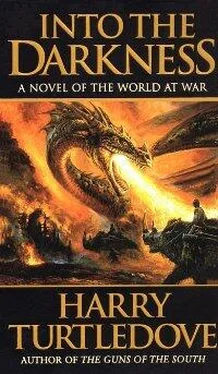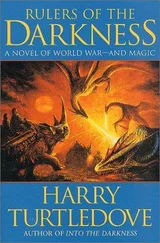Unkerlanter soldiers stood guard outside the ministry. They wore tunics, too, dull gray ones jarringly out of place in a city of whitewash and glowing golden sandstone. Sweat stained and darkened the tunics under the men’s arms and across their chests. Though suffering in what was for them dreadful heat, they held themselves motionless—all but their eyes, which hungrily followed every pretty young Zuwayzi woman walking past. Hajjaj laughed, but only inside, where it did not show.
King Swemmel’s minister to Zuwayza was a dour, middle-aged man named Ansovald. Maybe he had a magic that prevented sweat, or maybe he was just too stubborn to permit any such merely human failing. However he managed it, his tunic and his forehead remained dry.
“In the name of my king, I greet you,” he said to Hajjaj after a servant had escorted the Zuwayzi foreign minister to his chamber. “That you are so punctual shows your efficiency.”
“I thank you. And in the name of my king, I greet you in return,” Hajjaj replied. He and Ansovald spoke Algarvian, in which they were both fluent. Hajjaj thought Swemmel would have been efficient to send to Bishah a minister who spoke Zuwayzi, but saying as much struck him as undiplomatic. He himself understood more of the Unkerlanter language than he let on. As would any Zuwayzi in similar circumstances, he thought, I understand more Unkerlanter than I want.
“Well, what is the point of this meeting?” Ansovald demanded.
Abrupt as an Unkerlanter was a common Zuwayzi phrase. Had Hajjaj been visiting one of his countrymen, they would have shared tea and wine and cakes and small talk before eventually getting down to business. Had Ansovald come to the palace, Hajjaj would also have gone through the leisurely rituals of hospitality, as much to annoy Swemmel’s envoy as for the sake of form. Here, though, Unkerlanter rules prevailed. Hajjaj sighed, not quite invisibly.
“The point of this meeting, your Excellency, is to convey my sovereign’s displeasure with recent provocations along the border between our two kingdoms,” Hajjaj said. King Shazli was hopping mad and scared green, both at the same time. Displeasure suggested that as diplomatically as possible.
Ansovald’s massive shoulders moved up and down in a shrug. “I deny that any such provocations have taken place,” he said.
Hajjaj reached into a leather case and produced a short scroll. “Your Excellency, I have here a list of Zuwayzi border guards and soldiers killed, border guards and soldiers wounded, and Zuwayzi property on Zuwayzi territory destroyed during Unkerlanter incursions this season, and Unkerlanter buildings and encampments erected on land rightfully under the rule of King Shazli.”
Ansovald read through the document—written, like most diplomatic correspondence, in classical Kaunian—and then shrugged again. “All of these alleged incidents took place on Unkerlanter soil,” he said. “If anyone is the provocateur here, it is Zuwayza.”
“Now really, your Excellency!” Hajjaj exclaimed, indignation overcoming diplomacy for a moment. He pointed to the map of Zuwayza on the wall behind Ansovald. “Please look again. Some of these incidents occurred as much as ten or fifteen miles north of the border between our two kingdoms established by the Treaty of Bludenz.”
“Ah, the Treaty of Bludenz.” Ansovald’s smile was anything but pleasant. “Kyot the traitor dickered the Treaty of Bludenz with you Zuwayzin, thinking to be efficient: by not fighting your secession, he had more resources to use against King Swemmel. Much good it did him.” The unpleasant smile got broader. “Why should King Swemmel pay the least heed to anything the traitor did?”
Hajjaj was no longer indignant. He was appalled. He briefly wondered whether Unkerlant would have been a more pleasant neighbor had Kyot won the Twinkings War. He doubted it: Unkerlanters, worse luck, were Unkerlanters. Speaking now with great care, he said, “King Swemmel has conformed to the terms of the Treaty of Bludenz since gaining sole rule over Unkerlant. You would not be here as his minister, your Excellency, did he not recognize Zuwayza as a free and independent kingdom. Would it be efficient for him to overturn a policy that has given him good results?”
Not even the phrase that seemed so magic to Unkerlanter ears swayed Swemmel’s envoy. Shrugging yet again, Ansovald said, “What is efficient changes with circumstances. In any case, the protest you have conveyed from King Shazli is rejected. Have you anything more, or are we through?”
Even by Unkerlanter standards, that was brusque to the point of rudeness. “Please inform King Swemmel that we shall defend our borders,” Hajjaj said as he rose to go. He added a parting blaze: “Our legitimate borders.”
Ansovald yawned. Legitimacy did not concern him. Spitefully, Hajjaj wondered if it had concerned his father.
Outside on the street, the Zuwayzi foreign minister almost stripped off his tunic right there in front of the Unkerlanter ministry. That wouldn’t have shown the stolid, sweating guards anything they wanted to see, but it would have relieved his feelings. Not without regret, he restrained himself. As he rode back to the palace, he morosely watched sweat darken the cotton.
Once at the palace—a building whose thick walls of mud brick helped fight the heat—he did pull the tunic off over his head. King Shazli’s guardsmen grinned sympathetically as he sighed with relief. “Out of the funeral wrappings, eh, your Excellency?” one of them said, white teeth shining in his dark face.
“Even so.” Hajjaj rolled the tunic into a ball and stuffed it into his case. The breeze felt sweet on his skin. He waved to one of Shazli’s servitors. “Can his Majesty see me now? I’m just back from consulting with Ansovald of Unkerlant.” Neither by word nor by expression did he imply the meeting with Ansovald had gone anything but well. That was no one’s business but the sovereign’s.
“Of course, your Excellency,” the servant answered. “He has been awaiting your return.”
Shazli received his foreign minister in a chamber off the throne room. Hajjaj bowed low to the king of Zuwayza, who, without his golden circlet of rank, might have been anyone: in the absence of clothes, status could be hard to gauge. Shazli was a medium-sized, rather pudgy man in his early thirties, a bit less than half Hajjaj’s age. His father had regained Zuwayza’s freedom; some generations before, an Unkerlanter army that forced its way through the desert to Bishah had brought the land into the muscular embrace of its larger neighbor.
A serving woman carried in ajar of wine, a teapot, and a plate of honey cakes fragrant with cinnamon. She was comely; Hajjaj admired her as he admired the elegant ivory figurines adorning the chamber, and with hardly more desire. Being habitual to Zuwayzin, nudity did not inflame them.
Drinking and eating and chatting with the king helped Hajjaj relax; the thudding urgency he’d felt while meeting with the Unkerlanter minister receded, at least a little. After a while, Shazli said, “And how badly did Ansovald hurry you today? Efficiency.” He rolled his eyes to show what he thought of the term, or at least of the way the Unkerlanters used it.
“Your Majesty, I have never known worse,” Hajjaj said with feeling. “Never. And he rejected your protest out of hand. And he did something no Unkerlanter has ever done before: he questioned the legitimacy of the Treaty of Bludenz.”
The king hissed like a sand viper. “No, Unkerlant has never presumed to do that before,” he agreed. “I mislike the omen.”
“As do I, your Majesty, as do I,” Hajjaj said. “Up till now, we have been lucky in our relations with the Unkerlanters. They suffered hideously in the Six Years’ War and then, as if they were not satisfied, they warred among themselves. That gave your father of splendid memory the chance to remind them we still remembered how to be our own masters. Afterwards, they were busy picking up the pieces they themselves had dropped.”
Читать дальше












